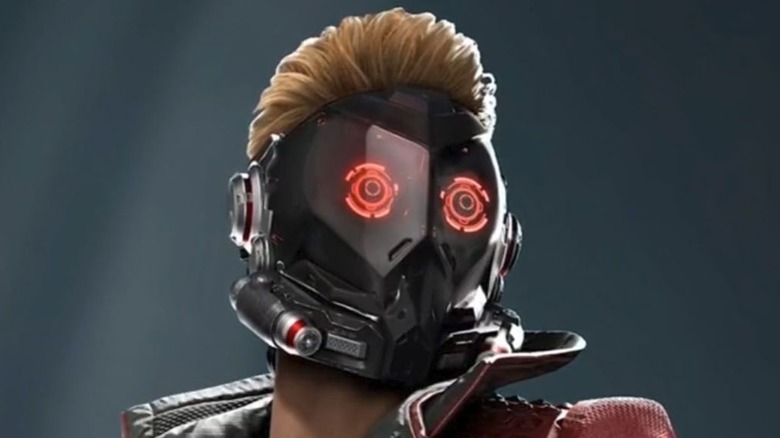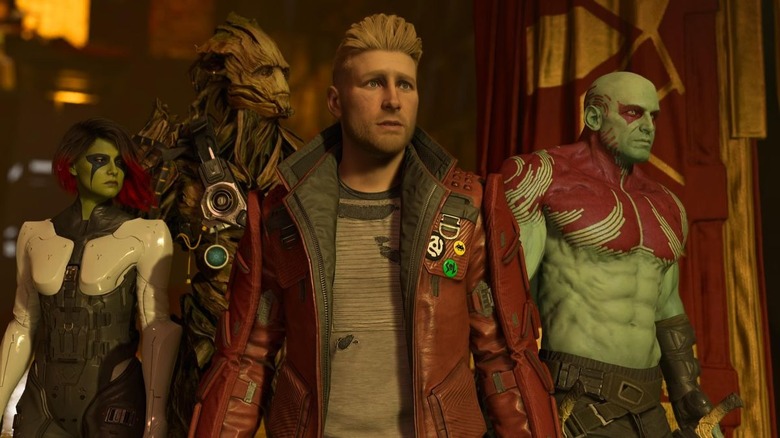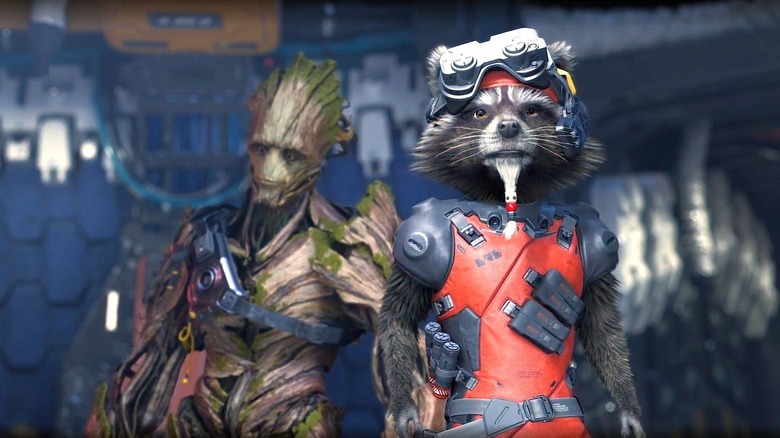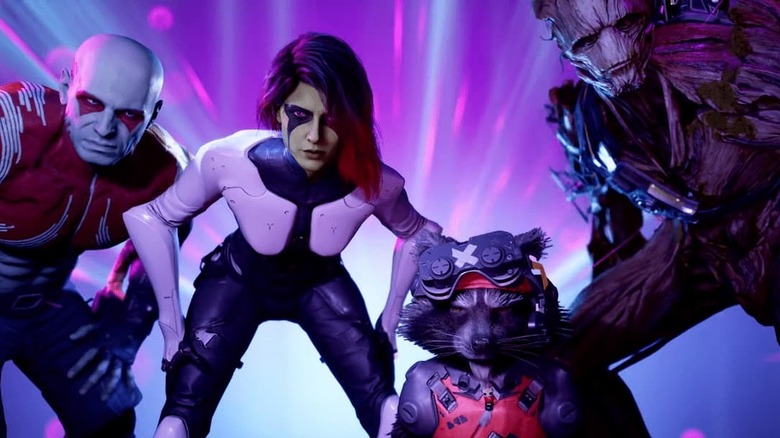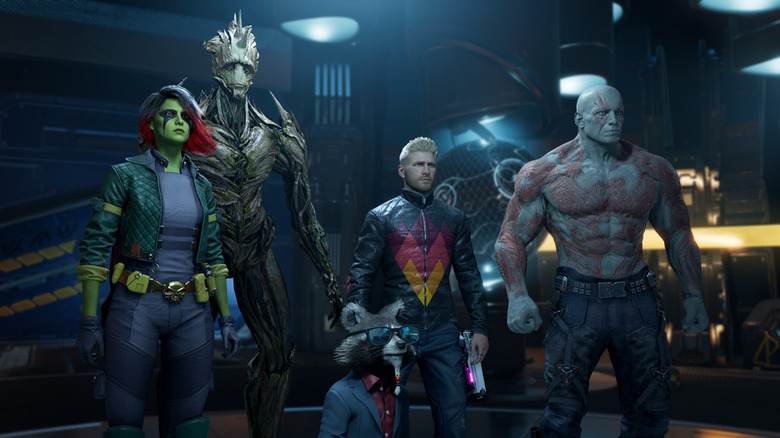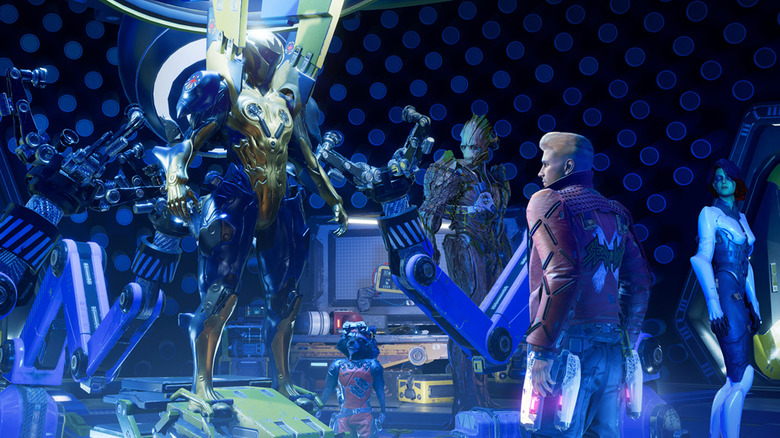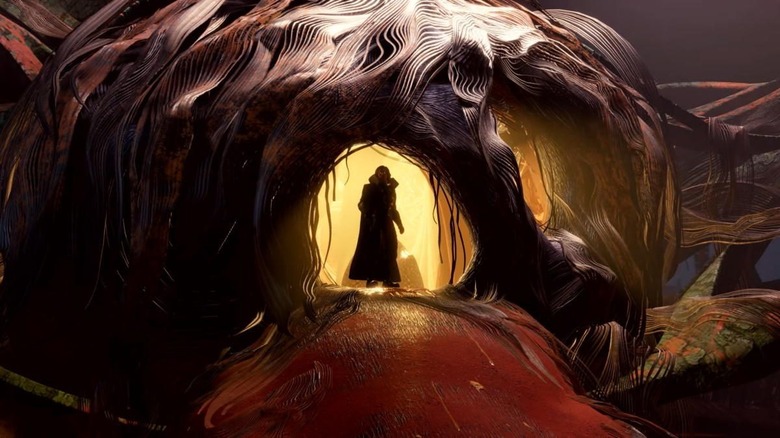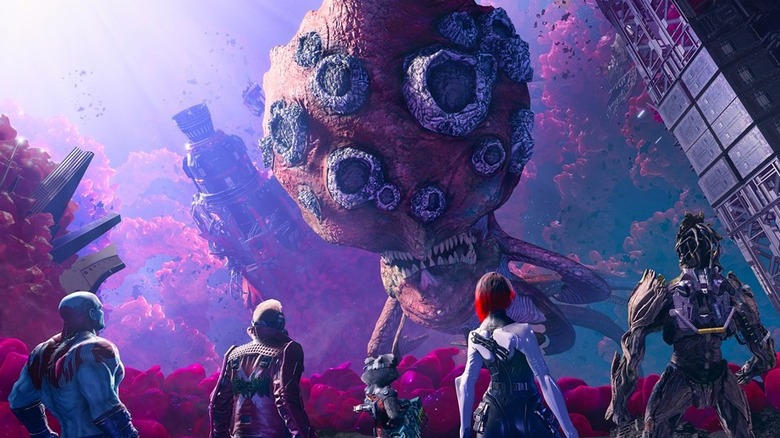The Ending Of Marvel's Guardians Of The Galaxy Explained
"Marvel's Guardians of the Galaxy" from Square Enix and Eidos-Montréal is many things, but one thing it is not is a recreation of the MCU incarnation of the team. In this take on the mythos, Peter Quill is the son of J'Son rather than Ego; Drax may be literal, but he's highly intellectual, and Rocket is — well, actually Rocket is basically exactly the same. These versions of the characters stay much closer to their comic book counterparts while still creating a totally unique version of the team — and that's relevant when talking about the ending of the story as much as anything else.
And the ending of "Marvel's Guardians of the Galaxy" isn't terribly complex on its face. Spoilers ahead.
After preventing The Universal Church of Truth from taking over the minds of everyone in the universe, the team has one last fight with Adam Warlock's evil counterpart Magus before carrying on as the affable troublemakers they are.
However, the story is more than just "outcasts beat intergalactic megachurch," fun though that story may be. Everyone in and around the Guardians is carrying around some heavy personal baggage and this story (and its ending) is all about how they deal with that baggage.
Marvel's Guardians of the Galaxy is about consequences
The opening mission of "Guardians of the Galaxy" seems like your basic fetch quest: the team is monster hunting, hoping if they bring back a good beast for Lady Hellbender, she will decide they're worthy of hiring for high-paying gigs. During the mission, Rocket makes a bet with Peter Quill over who can destroy the most parts of a certain disgusting creature. It seems innocuous enough, but the result is that they accidentally wind up releasing the very evil they have to fight again at the end of the game.
At the end of the game, Quill jokes that none of this would've ever happened if not for his bet with Rocket — except that's not really a joke so much as it is the cold truth. In fact, a common theme throughout the game is that thoughtless actions can lead to harmful outcomes. If you mistreat your teammates or other people around you as Star-Lord, they will be less likely to want to support you later.
Conversely, the game rewards the player when they seek out rare items that can be used use to trigger conversations with teammates. The more you listen to your compatriots' tales, the more you get out of the overarching story and the more enjoyable the game becomes. In a way, "Guardians" gamifies thoughtful, empathic behavior — which makes sense when you consider what the game's story is primarily about: grief.
Marvel's Guardians of the Galaxy centers around grief
The Guardians each have a tragic story to tell. Peter Quill's mother is killed before his eyes because of her relationship with Peter's dad J'son. Gamora finds herself in a scenario where she feels she has no choice but to murder her sister Nebula. Rocket is not only painfully experimented on, but he also gets manipulated upon escaping his prison. Drax loses his whole family to Thanos. Groot is... a tree man.
Other than Groot, though, one of the things that binds the Guardians and their story together is grief — specifically grief they haven't really dealt with. It turns out that the Guardians aren't the only people who haven't come to terms with their own grief, either. The whole reason why The Universal Church of Truth is so powerful is because it's selling the lie that grief can be undone — everyone you've ever loved and lost can return to you if you only have faith.
No one believes the lies more than the Church's matriarch, Nikki, a young girl who Quill is convinced is his long-lost daughter. Nikki loses her mother, Ko-Rel, and is so incapable of accepting the loss that she becomes a conduit for the Church to seize free will from every living being in the universe. The end of the game is centered around Peter using every lesson he's learned about recovering from grief to help Nikki do the same.
Of course, any story about grief wouldn't have a satisfying ending if it didn't talk about how to deal with that grief, which beings players to the next important theme explored by the ending.
Marvel's Guardians of the Galaxy is about helping others who are grieving
One of the ways that a video game is uniquely suited for storytelling is that it can easily lead you down a path that ends the story badly. In most cases that means death followed by a quick loading screen before starting from the last check point. However, at the end of "Guardians" you'll yourself at the previous check point not from dying, but from handling someone else's grief badly.
If you accept the lies of The Universal Church of Truth, a part of you lives inside of a moment that crystalizes whatever it is you want most. We see that false moment earlier in the game when Peter Quill finds himself with his mother, still alive, and all his Guardians friends also together and happy.
Similarly, Nikki imagines Peter and Ko-Rel as two loving parents who live together and are raising their daughter together. In the end we discover how untrue that fantasy is. Not only is Ko-Rel dead, but neither she nor Peter are Nikki's biological parents. Nikki's real parents were killed in the war — Nikki is an orphan.
There's so much grief for Nikki to sort through and only Peter Quill to help her do it. Interestingly, if Peter tries to compare his suffering with Nikki's it makes things worse. There's even an option that centers Nikki's grief around Rocket and Peter's silly bet at the beginning of the game. The only way for Quill to help Nikki is by acknowledging that her grief is unique to her and that only she can be trusted to accept hard truths and move forward.
In other words: the end of "Guardians" is about learning to be a better friend.
Marvel's Guardians of the Galaxy explores found families with its ending
For as long as the MCU has been telling Guardians of the Galaxy stories, there's been at least one persistent theme: Family is more often the people you find and not necessarily the people you're born with. In "Guardians of the Galaxy Vol. 2," the central plot focuses on Quill's false belief that he will find more love and meaning with Ego than he will with the Guardians. It turns out Ego is a mother-killing maniac who wants to control the galaxy — but Yondu, angry blue space pirate though he may be, is the kind of man who actually loves Quill like a father should.
"Marvel's Guardians of the Galaxy" also affirms the importance of found family. Rocket is only able to find a team to be on because he trusts Groot. Drax is only able to accept the loss of his daughter and wife and Gamora can only forgive herself for killing Nebula because the Guardians help them both to do it.
And so, the Guardians are able to defeat The Universal Church of Truth because they know how to help Nikki reject the false belief that she only deserves love if Peter and Ko-Rel are her blood parents. When Nikki sees that Peter and the Guardians care for her no matter what her origins are, she's able to turn away from The Church and help defeat it.
More than that, even after the conflict is resolved, players see through Nikki's experience that the Guardians are able to make more room in their ship and lives for her — because family is the thing you find, not the thing you're born with.
Marvel's Guardians of the Galaxy looks towards Nikki's future
A great deal of the ending of "Marvel's Guardians of the Galaxy" is about Nikki and her ability to accept her mother's death, throw off the yoke of the oppressive Universal Church of Truth, and find connection with the Guardians. However, while that's an ending point for the game, it suggests a beginning point for Nikki herself — one that comics fans may recognize.
Something interesting happens when Nikki uncouples from the Church and Magus (more on him later). She gains super powers and a nifty new hair style/ Nikki can float, control elements around her, and, again, suddenly has a short, blonde, glowing mane of hair — so what happens next?
Well, the obvious answer is that Nikki explores her new powers while becoming a full-fledged member of the team. However, what you might not know is that, in the context of Marvel Comics, Nicholette Gold (a.k.a. Nikki) isn't exactly a new member of the Guardians, she's a very old one — or a later one, depending on how you look at it. First appearing in the pages of Marvel Presents #4 all the way back in April 1976, Nikki was actually one of the first people to join up with the original Guardians team of Yondu, Major Victory, Starhawk, Martinex, and Charlie-27, and others. Despite being introduced first, however, this team hails from the 31st Century. Comics, everyone!
It's certainly not unheard of for time travel to happen within the Marvel Universe, so fans shouldn't be surprised if Nikki travels in time at some point to meet the original Guardians. At the very least, maybe she'll help Star-Lord break Yondu out of jail.
Marvel's Guardians of the Galaxy might not be done with Adam Warlock and Magus
There's one other major character whose arc is among the most important in the entire game: Adam Warlock. Before Nikki becomes the Matriarch of The Universal Church of Truth, the church's power all flowed through their original conduit: Adam Warlock and the Soul Stone. In the game, players see Adam Warlock as someone who became much too powerful, used that power thoughtlessly, and then hid from the responsibilities of his own actions. Warlock's evil half is so wicked that it even gets its own name: Magus.
Magus is what is also controlling Nikki when she becomes the Matriarch and it's partially on Adam Warlock to take that darkness back into himself and deal with it on his own. Although Magus nearly takes Adam once and for all, the heroes are able to defeat him with the Soul Stone, allowing Adam to assert himself again.
Magus exists in the comics, too, and, in addition to being a powerful force, he has the power to travel through time. Consider where (and when) Nikki fits into the comic book continuity and knowing that Magus is still technically living inside Adam Warlock's soul stone, it seems likely that a future Guardians game could involve more Magus, more Nikki, and other iterations of the Guardians of the Galaxy.
Marvel's Guardians of the Galaxy has plenty of stories to explore
While much of the game's focus is on Peter Quill, Adam Warlock, and Nikki — and halting the destruction of free will free will across the universe — but what about where the rest of the core team end up at the end of the game?
Some of these characters feel like they've reached a genuine resolution. As the one member of the team who actually bought into the Church's promise for a time, Drax feels like he's found the most growth by story's end. Drax is no longer chasing after his dead family, so he's probably the most functional member of the team at this point.
Both Rocket and Gamora each confessed to caring about (and maybe even loving) the rest of the team — albeit it under the duress of cataclysmic danger. That love means both Gamora and Rocket probably trust the people around them a little more — perfect fodder for things to go wrong. After all, Rocket's lost love could always come back in a future adventure. Meanwhile, Gamora talks a lot about having to kill Nebula — and it's entirely possible she may not be dead after all, thus bringing Gamora's past into conflict with her present.
The other character who's more in the fold than ever is Mantis. In the game, she's an ancillary character who only pops i. from time to time, but, by the end of the game, she seems to have joined the crew more fully. Mantis has the ability to see alternate futures, so her very presence might, once again, mean fans will see time played with in unorthodox ways, should the game get a sequel. Either way, the future is looking bright for the Guardians of the Galaxy.
